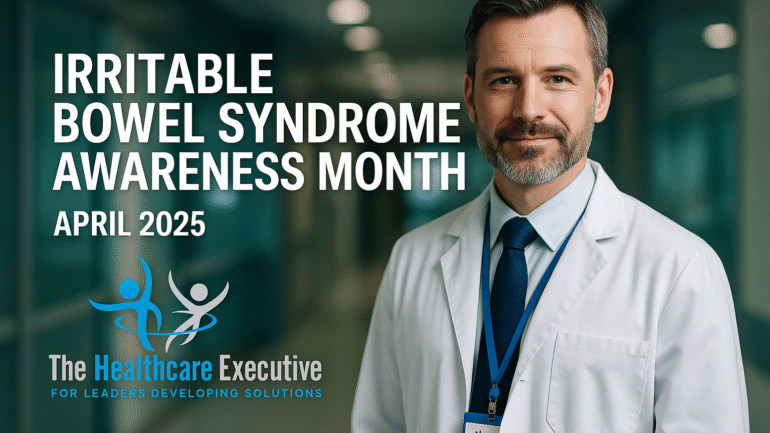Irritable Bowel Syndrome Awareness Month – April 2025

- Posted by Greg Wahlstrom, MBA, HCM
- Posted in Uncategorized
Leadership in Digestive Health and Chronic Care
Published: April 1, 2025
April marks Irritable Bowel Syndrome (IBS) Awareness Month, spotlighting millions of individuals living with complex digestive disorders. IBS affects between 25 and 45 million Americans, yet disparities in diagnosis and access to care persist. Hospital leadership must take this opportunity to realign strategy around chronic illness workforce development, interdisciplinary care models, and performance-based GI pathways. Forward-thinking systems like Johns Hopkins Medicine integrate gastroenterology with behavioral and nutritional care, yielding stronger outcomes. Executive teams that implement integrated digital therapeutics, symptom tracking apps, and precision dietary counseling can redefine IBS treatment standards. As patient expectations evolve, health systems must also commit to transparency and trust, two foundational elements we examine in our article on strategic trust in leadership. Therefore, April becomes a strategic turning point for leaders invested in GI health equity and operational excellence.
Executive leaders must also address the emotional and mental health burdens that come with IBS. Anxiety and depression are common comorbidities, often exacerbating symptoms and patient frustration. Leaders at UCLA Health’s IBS Program have integrated psychological services and mindfulness-based therapies into digestive care models, producing scalable improvements. A similar commitment is needed from administrators aiming to support high-value, low-burden care. The Healthcare Executive’s recent feature on rebuilding trust in U.S. healthcare underscores how executive actions influence both morale and healing. Patient-reported outcome measures, empathetic communications, and reduced diagnostic latency are critical KPIs for boardrooms to track. When CEOs treat IBS with the gravity of other chronic illnesses, the institutional narrative around digestive health starts to shift. As a result, IBS patients gain credibility, consistency, and compassion in care.
On the policy front, IBS remains vastly underfunded and misunderstood despite its prevalence. Executive leaders have a unique opportunity to advocate for greater inclusion of GI disorders in population health initiatives, CMS pilots, and innovation funding. By partnering with researchers at the National Institute of Diabetes and Digestive and Kidney Diseases (NIDDK), hospital systems can help scale promising therapies. Additionally, digital health programs like symptom-tracking tools, which some insurers now reimburse, allow organizations to reduce unnecessary admissions and length of stay. The Healthcare Executive has long supported digital-first models, explored in our article “The $5 Billion Question: Can Hospital-at-Home Really Scale?”. When IBS is addressed through cross-sector innovation and capital alignment, the ROI becomes measurable in both cost and quality. Consequently, IBS is no longer a side note in strategy—it becomes central to value-based care.
As we reflect on Irritable Bowel Syndrome Awareness Month, executive leaders must elevate the visibility of GI-related disparities and commit resources accordingly. Hosting town halls, publishing op-eds, and sharing clinical insights through platforms like IFFGD or national GI societies can galvanize both provider engagement and public support. More importantly, IBS must be integrated into broader diversity, equity, and inclusion (DEI) conversations, especially when disparities exist along racial, gender, and socioeconomic lines. To drive sustained impact, health systems should look to organizations like Mass General, which have implemented inclusive GI treatment protocols. At The Healthcare Executive, our platform exists to equip administrators with actionable strategy—read more in our article on health equity through strategic initiatives. In this respect, IBS awareness is not just an observance—it’s a leadership imperative.
As April 2025 continues, we call on every hospital and health system executive to champion IBS visibility, innovation, and empathy. Consider publishing internal memos of support, initiating cross-functional committees to review GI pathways, or allocating innovation grants to care redesign. These symbolic and structural moves send a powerful message to patients, physicians, and the broader public. Follow our updates on strategic observances and monthly awareness campaigns, or subscribe to The Healthcare Executive News & Strategic Events for upcoming insight. For now, let this month serve as a blueprint for how we lead with humanity—and design systems that truly heal. To conclude, April 2025 is more than a calendar entry—it’s a compass for smarter, more just healthcare leadership.
Discover More: For executives looking to expand their understanding of how trust, communication, and transparency drive performance across healthcare organizations, we recommend the following resource from our leadership blog.
Internal Links
- The Healthcare Workforce Crisis: Executive Solutions That Actually Work
- Rebuilding Trust in U.S. Healthcare: A Leadership Blueprint
- The $5 Billion Question: Can Hospital-at-Home Really Scale?
- Advancing Health Equity Through Strategic Initiatives
- Trust as a Strategic Asset: Reputation, Outcomes, and the Patient Voice
